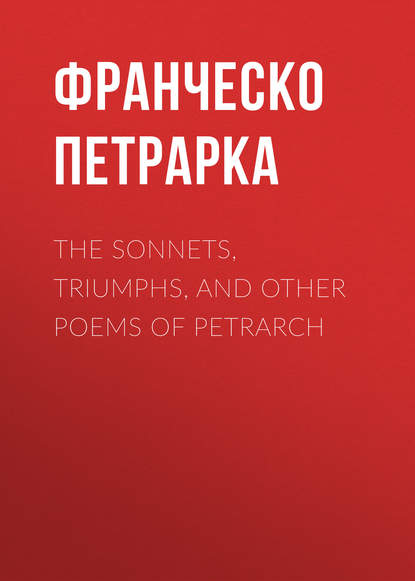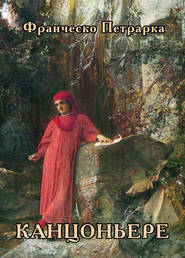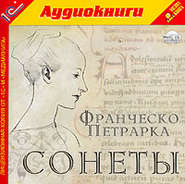По всем вопросам обращайтесь на: info@litportal.ru
(©) 2003-2025.
✖
The Sonnets, Triumphs, and Other Poems of Petrarch
Настройки чтения
Размер шрифта
Высота строк
Поля
Divinely bold, as when the foe retired
Before their Heaven-directed march, amazed,
When on the self-devoted men they gazed,
Till they provoked their fate. And Curtius nigh,
As when to heaven he cast his upward eye,
And all on fire with glory's opening charms,
Plunged to the Shades below with clanging arms,
Lævinus, Mummius, with Flaminius show'd,
Like meaner lights along the heavenly road;
And he who conquer'd Greece from sea to sea,
Then mildly bade th' afflicted race be free.
Next came the dauntless envoy, with his wand,
Whose more than magic circle on the sand
The frenzy of the Syrian king confined:
O'er-awed he stood, and at his fate repined.
Great Manlius, too, who drove the hostile throng
Prone from the steep on which his members hung,
(A sad reverse) the hungry vultures' food,
When Roman justice claim'd his forfeit blood.
Then Cocles came, who took his dreadful stand
Where the wide arch the foaming torrent spann'd,
Stemming the tide of war with matchless might,
And turn'd the heady current of the fight.
And he that, stung with fierce vindictive ire,
Consumed his erring hand with hostile fire.
Duillius next and Catulus were seen,
Whose daring navies plough'd the billowy green
That laves Pelorus and the Sardian shore,
And dyed the rolling waves with Punic gore.
Great Appius next advanced in sterner mood,
Who with patrician loftiness withstood
The clamours of the crowd. But, close behind,
Of gentler manners and more equal mind,
Came one, perhaps the first in martial might,
Yet his dim glory cast a waning light;
But neither Bacchus, nor Alcmena's son
Such trophies yet by east or west have won;
Nor he that in the arms of conquest died,
As he, when Rome's stern foes his valour tried
Yet he survived his fame. But luckier far
Was one that follow'd next, whose golden star
To better fortune led, and mark'd his name
Among the first in deeds of martial fame:
But cruel was his rage, and dipp'd in gore
By civil slaughter was the wreath he wore.
A less-ensanguined laurel graced the head
Of him that next advanced with lofty tread,
In martial conduct and in active might
Of equal honour in the fields of fight.
Then great Volumnius, who expell'd the pest
Whose spreading ills the Romans long distress'd.
Rutilius Cassus, Philo next in sight
Appear'd, like twinkling stars that gild the night.
Three men I saw advancing up the vale,
Mangled with ghastly wounds through plate and mail;
Dentatus, long in standing fight renown'd,
Sergius and Scæva oft with conquest crown'd;
The triple terror of the hostile train,
On whom the storm of battle broke in vain.
Another Sergius near with deep disgrace
Marr'd the long glories of his ancient race,
Marius, then, the Cimbrians who repell'd
From fearful Rome, and Lybia's tyrant quell'd.
And Fulvius, who Campania's traitors slew,
And paid ingratitude with vengeance due.
Another nobler Fulvius next appear'd;
And there the Father of the Gracchi rear'd
A solitary crest. The following form
Was he that often raised the factious storm—
Bold Catulus, and he whom fortune's ray
Illumined still with beams of cloudless day;
Yet fail'd to chase the darkness of the mind,
That brooded still on loftier hopes behind.
From him a nobler line in two degrees
Reduced Numidia to reluctant peace.
Crete, Spain, and Macedonia's conquer'd lord
Adorn'd their triumphs and their treasures stored.
Vespasian, with his son, I next survey'd,
An angel soul in angel form array'd;
Nor less his brother seem'd in outward grace,
But hell within belied a beauteous face.
Then Nerva, who retrieved the falling throne,
And Trajan, by his conquering eagles known.
Adrian, and Antonine the just and good,
He, with his son, the golden age renew'd;
And ere they ruled the world, themselves subdued.
Then, as I turn'd my roving eyes around,
Quirinus I beheld with laurel crown'd,
And five succeeding kings. The sixth was lost,
By vice degraded from his regal post;
A sentence just, whatever pride may claim,
For virtue only finds eternal Fame.
Boyd.
PART II
Pien d' infinita e nobil maraviglia
Full of ecstatic wonder at the sight,
Before their Heaven-directed march, amazed,
When on the self-devoted men they gazed,
Till they provoked their fate. And Curtius nigh,
As when to heaven he cast his upward eye,
And all on fire with glory's opening charms,
Plunged to the Shades below with clanging arms,
Lævinus, Mummius, with Flaminius show'd,
Like meaner lights along the heavenly road;
And he who conquer'd Greece from sea to sea,
Then mildly bade th' afflicted race be free.
Next came the dauntless envoy, with his wand,
Whose more than magic circle on the sand
The frenzy of the Syrian king confined:
O'er-awed he stood, and at his fate repined.
Great Manlius, too, who drove the hostile throng
Prone from the steep on which his members hung,
(A sad reverse) the hungry vultures' food,
When Roman justice claim'd his forfeit blood.
Then Cocles came, who took his dreadful stand
Where the wide arch the foaming torrent spann'd,
Stemming the tide of war with matchless might,
And turn'd the heady current of the fight.
And he that, stung with fierce vindictive ire,
Consumed his erring hand with hostile fire.
Duillius next and Catulus were seen,
Whose daring navies plough'd the billowy green
That laves Pelorus and the Sardian shore,
And dyed the rolling waves with Punic gore.
Great Appius next advanced in sterner mood,
Who with patrician loftiness withstood
The clamours of the crowd. But, close behind,
Of gentler manners and more equal mind,
Came one, perhaps the first in martial might,
Yet his dim glory cast a waning light;
But neither Bacchus, nor Alcmena's son
Such trophies yet by east or west have won;
Nor he that in the arms of conquest died,
As he, when Rome's stern foes his valour tried
Yet he survived his fame. But luckier far
Was one that follow'd next, whose golden star
To better fortune led, and mark'd his name
Among the first in deeds of martial fame:
But cruel was his rage, and dipp'd in gore
By civil slaughter was the wreath he wore.
A less-ensanguined laurel graced the head
Of him that next advanced with lofty tread,
In martial conduct and in active might
Of equal honour in the fields of fight.
Then great Volumnius, who expell'd the pest
Whose spreading ills the Romans long distress'd.
Rutilius Cassus, Philo next in sight
Appear'd, like twinkling stars that gild the night.
Three men I saw advancing up the vale,
Mangled with ghastly wounds through plate and mail;
Dentatus, long in standing fight renown'd,
Sergius and Scæva oft with conquest crown'd;
The triple terror of the hostile train,
On whom the storm of battle broke in vain.
Another Sergius near with deep disgrace
Marr'd the long glories of his ancient race,
Marius, then, the Cimbrians who repell'd
From fearful Rome, and Lybia's tyrant quell'd.
And Fulvius, who Campania's traitors slew,
And paid ingratitude with vengeance due.
Another nobler Fulvius next appear'd;
And there the Father of the Gracchi rear'd
A solitary crest. The following form
Was he that often raised the factious storm—
Bold Catulus, and he whom fortune's ray
Illumined still with beams of cloudless day;
Yet fail'd to chase the darkness of the mind,
That brooded still on loftier hopes behind.
From him a nobler line in two degrees
Reduced Numidia to reluctant peace.
Crete, Spain, and Macedonia's conquer'd lord
Adorn'd their triumphs and their treasures stored.
Vespasian, with his son, I next survey'd,
An angel soul in angel form array'd;
Nor less his brother seem'd in outward grace,
But hell within belied a beauteous face.
Then Nerva, who retrieved the falling throne,
And Trajan, by his conquering eagles known.
Adrian, and Antonine the just and good,
He, with his son, the golden age renew'd;
And ere they ruled the world, themselves subdued.
Then, as I turn'd my roving eyes around,
Quirinus I beheld with laurel crown'd,
And five succeeding kings. The sixth was lost,
By vice degraded from his regal post;
A sentence just, whatever pride may claim,
For virtue only finds eternal Fame.
Boyd.
PART II
Pien d' infinita e nobil maraviglia
Full of ecstatic wonder at the sight,














